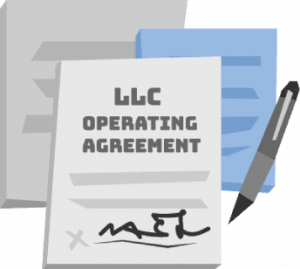Register an Ohio Foreign LLC
An Ohio Foreign LLC is a limited liability company that does business in Ohio but was formed in another state or jurisdiction. When a foreign LLC wants to do business in Ohio, it must file a Registration of a Foreign Limited Liability Company application with the Ohio Secretary of State, and pay $99 in state fees ($199 for expedited filings).
Northwest can register your foreign LLC in Ohio for just $225 + state fees. This includes paperwork, a year of registered agent service, and a free trial of our identity services that take your business online. Plus you’ll get access to our attorney-drafted legal document templates, personal help from our Corporate Guides®, and Privacy By Default®.
Ready to Register A Foreign LLC in Ohio?
GET STARTEDHow to Register a Foreign LLC in Ohio
The process of registering as a foreign LLC is referred to as foreign qualification. In Ohio, this process includes appointing an Ohio Statutory Agent and submitting a Registration of a Foreign Limited Liability Company application to Ohio’s Secretary of State. Once they approve your application, you’ll receive a Certificate of Authority from the Secretary of State authorizing your LLC to conduct business in Ohio.

1. Appoint an Ohio Statutory Agent
An Ohio statutory agent—also called an Ohio registered agent—is an individual or another business that your LLC designates to receive legal documents on your LLC’s behalf. Your statutory agent must have a physical address in Ohio where they can accept documents during regular business hours.
For foreign LLCs without physical addresses in Ohio, it’s often most convenient to hire a registered agent service. By nature, registered agent services are always available during business hours, so going this route ensures timely receipt of service of process and other important legal documents.
Yes, but to act as your own registered agent in Ohio, you need to live in Ohio and be able to accept service of process in person during standard business hours.

2. Verify Your Foreign LLC's Name
Ohio Revised Code § 1706.513 states that foreign LLCs must comply with the rules for naming LLCs described in § 1706.07.
The names of all LLCs operating in Ohio must:
- Include the words limited liability company or an abbreviation like LLC or limited
- Be distinguishable from the name of any other LLC, partnership, or corporation in Ohio
- Not contain a trade name that another business has reserved the exclusive right to use
Check if your LLC’s name is already being used in Ohio with a business name search. If your name doesn’t comply with § 1706.07, you’ll need to choose an assumed name to do business under in Ohio.

3. Launch Your Business Identity
Once your business is up and running in the new state, you’ll want to be able to connect with the new market of consumers. Having a robust and localized digital presence can help build your business’ identity, which in turn will make your business seem more trustworthy and professional, even if you’ve only just started offering services/products.
We can help you build a custom website that is securely hosted with an unique domain, plus give you a local phone number and up to ten email addresses to help establish your business in Ohio.
Learn more about how to launch your business identity in a new state.

4. Complete the Application for Registration
Before your LLC can legally conduct business in Ohio, you’ll need to file a Registration of a Foreign Limited Liability Company application with the Ohio Secretary of State. You must include the following information in your application:
- Your LLC’s name in its jurisdiction of formation
- Your LLC’s assumed name in Ohio (if needed)
- Your LLC’s jurisdiction of formation
- The effective date and time of your LLC (if you do not want your LLC formed upon approval, you can select a day and time up to 90 days in the future)
- The name, mailing address, and signature of your LLC’s statutory agent
- The names and signatures of the authorized individuals who completed your application
The application includes a cover letter that must contain the name, address, phone number, and email address of the person who will be sent your Certificate of Authority once it is approved. In your cover letter, you can also sign up for the Secretary of State’s filing notification system and receive email notifications regarding your application status.
Ready to file for foreign qualification? Register your Ohio Foreign LLC now with Northwest.
It costs $99 to file your foreign LLC registration application in Ohio. Expedited service and pre-clearance filing are available for additional fees. Expedited filing fees start out at $100 for 2-day service.
You can file your Ohio foreign LLC registration application by mail, in person, or online.
By mail:
Regular Filing
Secretary of State
P.O. Box 670
Columbus, OH 43216
or
Expedited Filing
P.O. Box 1390
Columbus, OH 43216
In-person:
Client Service Center
22 North 4th Street
Columbus, OH 43215
Online: Ohio Business Filings portal
No. As a foreign LLC, you don’t need to file Ohio Articles of Organization.
No. Ohio does not require foreign LLCs to submit a certificate of good standing from their home jurisdictions as part of the application process.

5. Receive your Certificate of Authority
The Ohio Secretary of State will send your Certificate of Authority to the address listed in the cover letter of your registration application. If you sign up for email notifications in your application, you’ll receive email updates on your application status. You can also check your status online if you create an account with the Secretary of State’s Ohio Business Filings online portal.
Ohio will process your paperwork in about seven days. If you’re in a hurry you can pay the state an extra $100 and Ohio will approve your Certificate of Authority in three days.

Ohio Foreign LLC FAQ
Amend your Ohio foreign LLC by filing a Certificate of Correction for a Domestic or Foreign Limited Liability Company with the Ohio Secretary of State. You’ll also need to include a cover letter that contains the name, address, phone number, and email address of the person you want to receive your approval certificate. Your Certificate of Correction application can be submitted by mail, in person, or online. The filing fee is $50.
As is the case in many other states, Ohio state law does not directly define doing business. This allows the state to adapt more easily to changes in the business landscape (for example, when businesses move from in-store to online sales). Luckily, there are some general rules to determine whether a company is technically doing business in a state, based on its physical and economic presence there. The following activities are common examples:
- Operating stores, research facilities, warehouses, or offices
- Hiring and paying employees
- Engaging in multiple business transactions in the state over time
- Any actions that result in having to pay taxes in Ohio, including online sales
Note that if your LLC generates more than $100,000 in gross receipts or conducts 200 or more separate online transactions, you must pay state taxes to the Ohio Department of Taxation.
Additionally, Ohio Rev Code § 1706.512 clearly defines certain activities as NOT to be considered transacting business in Ohio. These activities include, but are not limited to:
- Holding member meetings or other activities relating to your LLC’s internal affairs
- Having bank accounts
- Having offices or agencies dedicated to managing your LLC’s own securities
- Owning real estate or property without utilizing it for business means
- Creating or acquiring debts or security interests in real or personal property
- Selling through independent contractors
- Conducting interstate commerce
- Performing isolated transactions
- Maintaining and defending lawsuits
- Owning a controlling interest in another business entity operating in Ohio
Read more: What Exactly Does “Doing Business” in Another State Mean?
If you do business in Ohio without registering as a foreign LLC, your company could face negative legal and financial consequences, as described by Ohio Rev Code § 1706.515:
- The state is permitted to level fines against your unregistered foreign LLC. If found to be in violation of the law, your LLC could be sued by the Ohio Attorney General’s office. The judge presiding over your case can then determine a fine and order you to pay it.
- Your LLC will be unable to pursue legal action to collect debts from individuals and entities in Ohio.
- Your LLC will be unable to bring suits of any type against individuals and entities in Ohio, and the state will pause any proceedings you already have underway. However, you will be able to defend yourself in court if sued by others in Ohio.
No. Foreign LLCs in Ohio are not required to file annual reports with the state.
Like domestic Ohio LLCs, your LLC is on the hook for all applicable Ohio taxes. Your LLC will be taxed as a pass-through entity by default, meaning your profits will pass through your company and get reported as income on your members’ taxes. Note that your LLC will be required to pay additional taxes under the following circumstances:
- If your business generates at least $100,000 in gross receipts or conducts 200 or more separate transactions online in Ohio during the calendar year, you’ll be subject to Ohio’s Out-of-State Sellers tax.
- If your LLC has over $1 million in gross receipts during the calendar year, you’ll need to pay Ohio’s Commercial Activity Tax.
You can pay all Ohio state taxes by registering with the Ohio Department of Taxation.
To withdraw your Ohio foreign LLC, you must submit a Certificate of Cancellation of Registration of a Foreign Limited Liability Company application to the Ohio Secretary of State. Your Certificate of Cancellation application can be submitted by mail, in person, or online. The filing fee is $50.
It is important to note that cancellation of your LLC’s ability to do business in Ohio does not change its status in any other state where it has registered to do business.





